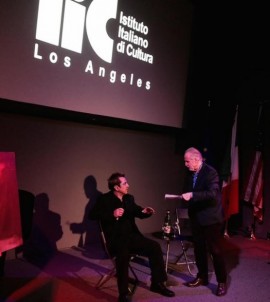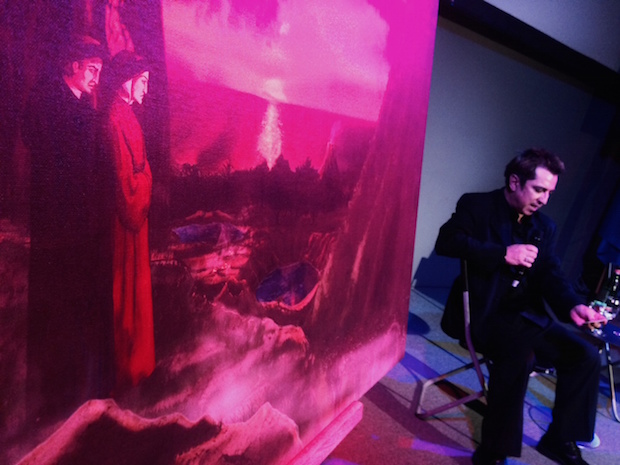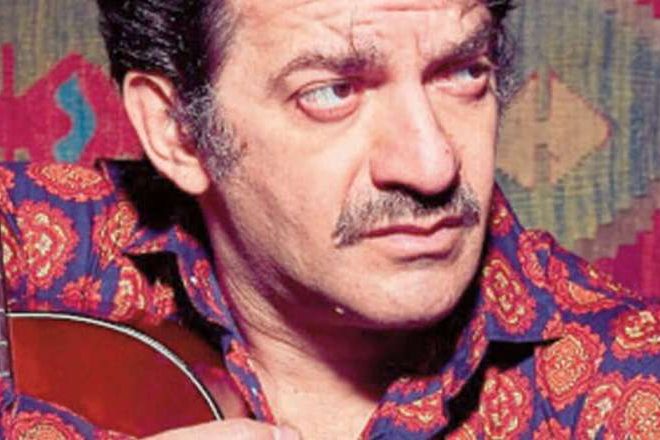On Tuesday, February 10th, the Italian Cultural Institute in L.A. commemorated the 750th anniversary of Dante Alighieri’s birth. However, this is just the first “course” of a varied and rich menu, offered by the IIC, celebrating the Italian language from next October on.
The special screenings were introduced by Prof. Massimo Ciavolella, who taught for many years at Carleton University (in Ottawa) and at the University of Toronto, and is currently Director of the UCLA Center for Medieval and Renaissance Studies.

The Professor stressed the huge influence exerted by Dante’s Divina Commedia and his other works on every field of the arts, from painting to cinema. In the latter category, he referred to the Dantesque psychological thriller Seven (1995), directed by David Fincher and written by Andrew Kevin Walker, whose extremely dark and violent tones have been questioned since then.
However, nobody has rendered the Divine Comedy more accurately than Boris Acosta. The director and producer, who hails from an Italian-Portuguese family, studied first-hand Alighieri’s literary works in the original Volgare Italiano (Primitive Italian). His broad education boasts a degree in Applied Mathematics (Scientific Programming) and a minor in Italian Literature with emphasis in studying The Divine Comedy. With time, he has earned the respect and admiration of Dantologists around the world for his philologically exact adaptation of Alighieri’s masterpiece.

The Divine Comedy is certainly one of – if not the most – analyzed literary works among mathematicians all over the world, and the one arousing the keenest fascination. The fact that Acosta has a mathematical background corroborates this opinion.
The first screening of the evening was: Dante’s Inferno – Abandon All Hope (2010), an educational documentary, freely available online to students from all over the world.
It is narrated by Jeff Conaway and is made of most of 19th century French artist Gustave Doré ‘s lithograph illustrations and excerpts from the first Italian silent feature film ever-made, L’Inferno (1911). This film employed refined special effects and, remarkably, is also one of the few containing a brief unflattering depiction of Muhammad. Beware that the legitimacy of similar visual representations have caused lot of controversy among Muslims, leading very recently to the tragic carnage by two Islamist terrorists in the office of the satirical newspaper Charlie Hebdo, in Paris.
The plot, told by actors who recite selected passages, unfolds through Dante’s and his guide Virgil’s journey across the three main partitions of Hell: Upper Hell – outside the city of Dis – for the four sins of indulgence (lust, gluttony, avarice, anger); Circle 7 for the sins of violence; and Circles 8 and 9 for the sins of fraud and treachery.
The second screening: Dante’s Hell Animated (2014), especially aiming at children, is freely available to all educational institutions worldwide. It is based on an original 69-piece art collection by Dino Di Durante and retells the same plot as the previous, through a series of frames, animated in an old-fashioned style, in which each one has a fixed landscape background marvelously drawn, while the characters – voiced by actors – act mechanically in a two-dimensional space.
The next step for Boris is going to be the completion of the feature-length adaptation from Dante’s trilogy: Inferno – Purgatory and Paradise.





























